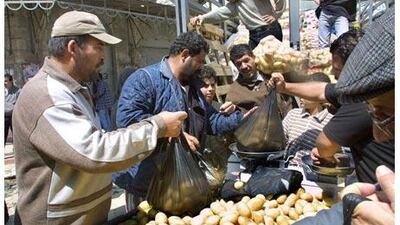RAMALLAH // The cries of Hussam, the market-vendor, to buy his juicy winter "strawberries, strawberries" ring clear across the bustling street market in Ramallah.
But this 25-year-old stall-keeper takes no pride in his trade. "They are from Israel," he said, casting a gloomy eye over the gleaming pile of fruit. "Of course I am not happy about selling them. But what can I do? There is no alternative." It is a much-repeated complaint in this Palestinian city. While the Palestinian Authority prime minister dramatically set fire to goods from Jewish settlements last week, and the government urged its citizens to boycott these products, Israel still has a chokehold on a captive market in the occupied West Bank, making it almost impossible for local companies to compete.
Israeli or other foreign goods currently represent around two-thirds of the Palestinian market - but it is not just market saturation that accounts for this hefty slice of the retail pie. A consumer survey conducted by Intajuna in 2007 revealed that most Palestinians feel that their products are inferior to Israeli or other foreign equivalents.
This is something that one organisation is trying to change. "We want to create a consumer pull towards Palestinian goods," said Nahed Freij, project manager at Intajuna - literally "our products". The idea, explained Ms Freij, who works for a Palestinian development consulting company, is to get people to support local products, "not just because they are Palestinian, but because they are good quality". The problem, Ms Freij said, is a sort of residual bad image. As part of the first Palestinian intifada that broke out in 1987, a strict boycott of Israeli goods was enforced and these products were banished from Palestinian stores. But the local goods that replaced them were not up to scratch and, contrarily, set up a demand for the Israeli products that later reappeared on shelves. Palestinian companies have significantly improved their products since then, but the consumer biases remain hard-wired.
Abu Sufian, who has popped into a small Ramallah store to buy milk, said: "I try to buy Palestinian but, honestly, the quality is not as good as the Israeli products. I think the money I spend on Israeli products is worth it because they are better." Intajuna has tried to break this perception by building consumer awareness. A campaign across West Bank stores late last year flagged products from 11 Palestinian companies with point-of-sale promotion and prominent displays reinforced with a mass-media campaign.
Putting Palestinian products directly under shoppers' noses, while also pushing the quality assurance angle, has proved to be a winning formula. The companies involved reaped a reported sales surge of up to 60 per cent for their products, including goods such as potato chips, toiletries, ice cream, flour and cooking oil. At the popular Gardens supermarket in the Ramallah suburb of Al Tireh, Palestinian products are flying off the shelves in preference to imported equivalents, several months after Intajuna ran its promotion at the store.
The store's 36-year-old manager, Mohammed Amin Abu Zaineh, said: "Now our customers are aware of the Palestinian products, and they trust the quality. Me personally, I get annoyed when people buy Israeli products, and this campaign was very important to me." So important, in fact, that he provoked a minor spat with a global tea giant when he ditched its front-of-store display in favour of the Intajuna stand. "Yes, that did cause me some problems," he said. "But I refused to give in. I like this Palestinian campaign and I'm 100 per cent behind it."
Ms Friej said building retail knowledge around issues such as effective merchandising and distribution has been vital to the campaign. She hopes the project will spawn a decreasing reliance on wholesalers, whose product distribution is based purely on the best rates of return - in a slanted market, Israeli goods are cheaper to make and so the profit margins are wider. One manufacturer of toilet rolls and tissues now has near-blanket coverage in the West Bank because the company does its own deliveries, rather than letting a disinterested wholesaler do so.
But Palestinian manufacturers currently cater to only a fraction of the market's requirements, so imports are still required to fill the gaps. In addition, Palestinians cannot ban Israeli products from the marketplace, because of the agreements signed between Israel and the PLO as part of the Oslo peace process in 1994. Trade treaties guarantee the free-flow of trade. In practice, however, this has become a one-way system as cheap Israeli products pervade the Palestinian market, while Palestinian exports are routinely hampered by Israeli checkpoints, closures and restrictions, making them more expensive.
At a stall in Ramallah's open-air market, just-picked potatoes from Jenin, in the northern West Bank, stand no chance against potatoes from Israel selling at half the price. "I want to buy the Palestinian ones, but with ten children to feed, I can't afford to," says Fatima, while the market-traders bemoan the flood of cheap, sub-standard produce from the Jewish state. Intajuna cautions that it takes time for consumer confidence in local produce to grow. But the combination of Palestinian retail clout and brand loyalty could fast become a potent force of economic resistance - especially since the political motivation already exists.
Anwar Hamad, who was clothes-shopping with his pregnant wife and two children in Ramallah, said: "People who buy Israeli products without thinking don't have a goal in life." He already takes care to buy Palestinian whenever possible, and Israeli only as a last resort. "Each shekel spent on Israeli products is supporting the occupation," he said. "Every shekel buys a bullet." * The National

